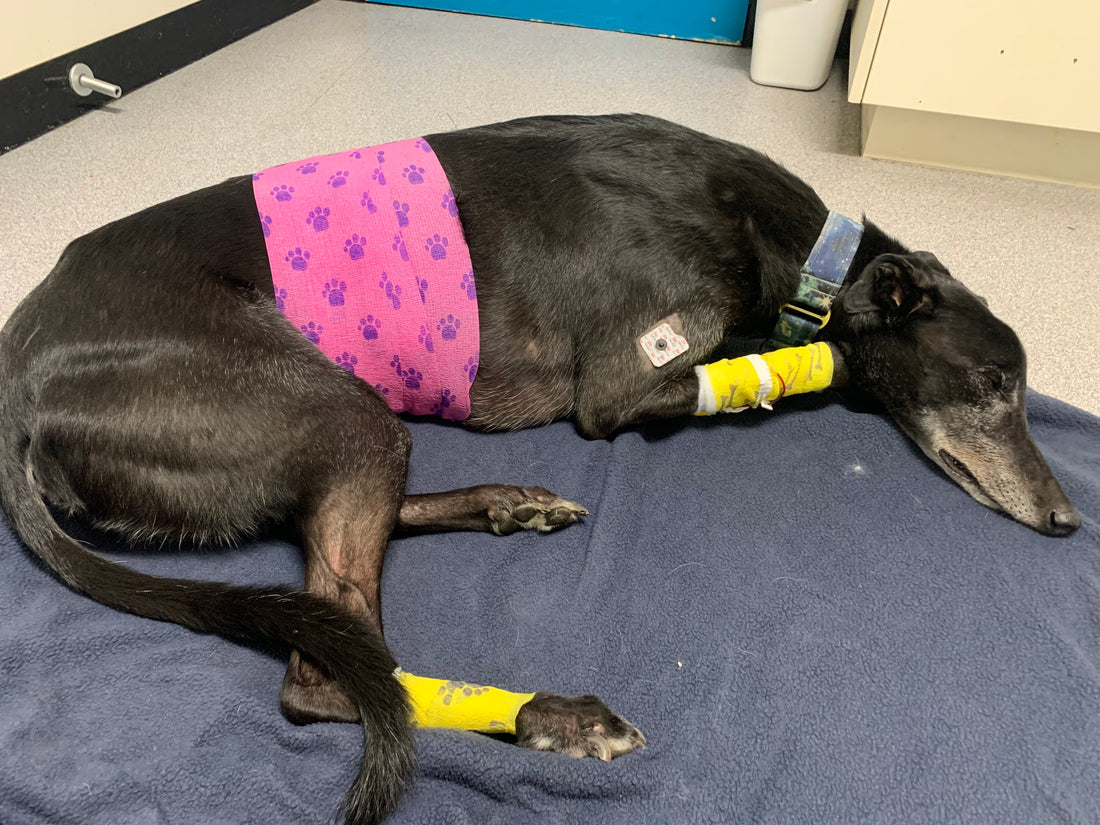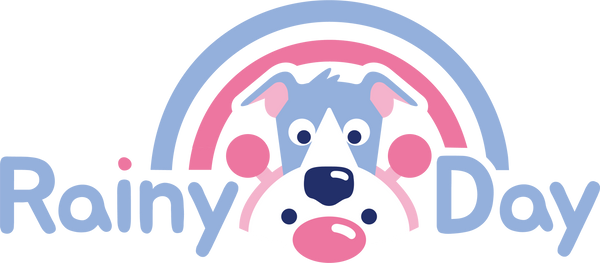
Surviving Bloat: A Journey of Resilience With My Greyhound
Share
Picture this: it was a beautiful Spring day in New York City, and I was thrilled to finally fulfill my childhood dream of visiting the Statue of Liberty with my parents. Life was looking pretty perfect, until it all came crashing down – I received devastating news that my favourite son and greyhound Archie was very unwell. He was rushed to emergency surgery for bloat, and I was thousands of miles away, feeling helpless and guilty. Here’s what I learnt along the way.
What is bloat? If you own a deep-chested breed, you’re likely familiar with the dangers of bloat. The medical term for bloat is gastric dilatation-volvulus (GDV) complex, which is a medical and surgical emergency. Without swift treatment, the outcome is fatal.
The rules are clear: break up meals, slow down their eating, control water intake, and avoid vigorous exercise before and after meals. We diligently followed these guidelines for Archie, always living in fear of this dreaded condition, we took every precaution to avoid it. The hows and whys don’t matter, because Archie was at the mercy of his body, and in the safe hands of the emergency vets.
Thankfully, my partner David wasted no time in rushing Archie to the vet when he noticed the signs of bloat: loss of appetite, unsuccessful attempts to vomit, and crying in pain. It's crucial to pay attention to your dog's body language and trust your gut instincts, as the symptoms of bloat can be mistaken for an upset stomach, or some may mistake it for food fickleness.
What I’ve learnt is that, sometimes, despite doing everything right, life throws unexpected curveballs. Stress, age (Archie is nearly 10), or simply bad luck due to his breed may have contributed to the occurrence of bloat. And so, Archie underwent emergency surgery while I anxiously awaited news from David, who kept me updated from the veterinary clinic in Melbourne, Australia.
The distance between us was 16,661km long – measuring my grief, stress and anxiety about being so far away. In our Manhattan hotel room, I lay in bed and became a mix of cold sweat and nerves. I didn’t tell my parents – I didn’t want to ruin their holiday. It was the first week of our vacation and my mind was racing, I was already looking at return flights back to Australia.
David messaged. It read: “The surgery was a success."
Relief. Exhaustion. Tears.
My resilient, brave boy made it through. Everything would be okay, although I knew that there was still a long road to recovery ahead. I knew, at least, that he would be waiting for me when I returned home in two weeks time.
Archie spent three more nights at the vet hospital – he experienced some internal bleeding, which his vet team assured was not unusual for greyhounds, and his appetite was slow to return. When Archie was finally allowed to come home, David reported that he was weak, underweight and exhausted. Our poor boy had endured so much.
Knowing that Archie had survived gave me the opportunity to try to enjoy the rest of our trip, but that didn't mean I wasn't worried. I worried about Archie’s recovery, and potential complications, and also about David, who had to take time off work to be there for Archie. When he couldn't be there, he relied on our gorgeous friends to help out. I’m so proud of my two strong good boys – but I was incredibly proud of David, because he rarely asks for assistance – in the last 10 years, I can probably count on one hand the number of times he’s ever asked anyone for help.
Finally, the day arrived when I returned home in the early hours of the morning. As I walked through the front door, dragging my heavy suitcase – the weight of everything that had occurred just hit me. I was overwhelmed by so many emotions – love, gratitude, guilt, sadness.
Here’s what I learnt, and I’m sharing it with you to spread awareness:
Trust yo’ gut – your instincts when it comes to your dog’s health are your guide. You know your dog best, so listen to your gut and don’t hesitate to seek veterinary advice.
Asking for help is brave – try to leave any feelings of shame at the door when it comes to asking for help during emergencies. It's essential to put aside any pride and reach out for assistance. Your dog's well-being is the priority.
Go gentle with that good heart – recognise and accept that it's normal to experience a range of emotions during times where our loved ones are injured or unwell. Give yourself permission to process and express these emotions. It's a challenging journey, and it's okay to feel overwhelmed.
Knowledge is key – don’t be afraid to ask questions, or to call your vet to clarify instructions. Know your dog's condition, the surgical procedure, educate yourself about the recovery process. Understanding these details can alleviate your anxiety and provide a sense of control.
Your dog is in good hands – vets are experienced, knowledgeable and have your dog's best interest at heart. They’ll do everything possible to ensure your dog has the very best outcome possible. Maintain open communication with your vet, ask questions and voice any concerns.
Bystander grief is real – take care of yourself during your dog's recovery. Remember that your wellbeing matters, too. Prioritise rest, eat well, and engage in activities that help you relax and recharge. By looking after your own emotional and physical health, you'll be better equipped to support your dog.
Celebrate the small victories – these victories may be as simple as your dog eating a full meal, taking a short walk, or displaying signs of increased comfort. These milestones are worth acknowledging and celebrating.
Go slow and steady – be patient and realistic, recovery takes time, and setbacks may occur. Your dog may have good and bad days, and progress may be gradual. Practice patience throughout the healing process and set realistic expectations.
It's undeniable that bloat is a terrifying condition that takes a toll on everyone involved. However, when caught early, there is a good chance of survival, and this surgery is quite common for veterinarians to perform. Nevertheless, it doesn't diminish the fear and worry it brings. Our little family feels incredibly grateful to have emerged from this situation stronger, more united, and more supportive of each other. Whilst I wouldn't wish this experience on anyone, I hope sharing our story can provide solace and guidance to other brave dog parents facing their own battles with a bloat diagnosis.
For more information about bloat, signs and symptoms please visit: https://vcahospitals.com/know-your-pet/bloat-gastric-dilatation-and-volvulus-in-dogs

2 comments
Thank you for sharing Archie’s story. Thrilled for the happy ending.
Thank you so much for sharing your experience with Archie’s GDV. I had complications following a surgical procedure that resulted in a blocked intestine and am now also susceptible to bloat myself! As the owners of greyhounds, we are always wary of this happening but your post is the first personal experience I have come across. Would love to hear how Archie is now doing and whether anything has changed since his hospital admission.